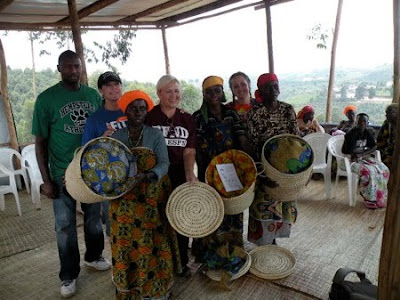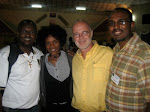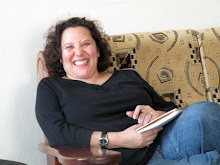The Best Read of 2010... The Last Week by Marcus Borg and John Dominic Crossan. This text revolutionized (no, not an overstatement) how I understand Holy Week. I was educated, inspired and provoked as I turned every page. Each chapter takes on a day of Holy Week and brings fresh insight to the story we think we know. I see the passion, the cross and the resurrection with new eyes (and a new heart).
Best book I read again... The Writing Life by Annie Dillard. I am a firm believer in reading books again and again. I want to be washed over again by great words and encounter them afresh with each new year. This year I was regaled with my revisit of The Writing Life as I contemplated the task of preaching. She so wonderfully unpacks her art, sharing what it is to be an experienced writer / art maker. She both describes and demonstrates the best of her craft. Well worth re-reading again...
Best recommendation... Cold Tangerines by Shauna Neiquist. I did not get many book recommendations this year, come to think of it. But one that stands out... this lovely gem recommended by Sarah Gonski. This is a book as fresh as its title... it is colorful, crisp and chock full of grace-filled stories from an everyday life. This read was like a little pick-me-up! (Thanks, Sarah!)
Most Beautiful Read... An Altar in the World by Barbara Brown Taylor. Here is the problem, I read this book in 2009. But here is the fact - it is the first book that comes to mind when I think of a beautiful read, and it apparently casts a long shadow! I would say that if pressed for the raving beauty of 2010, it would be Leaving Church (also penned by Barbara Brown Taylor). She is just a lush, lovely, luminous communicator. She honors words, she hones them, she allows them to serve the truth in revealing ways. A master...
Best book on preaching... The Word Militant by Walter Brueggemann. I read a handful of books on preaching this year in preparation for teaching a homiletics class. Let me tell you, it is not easy to find a good book on preaching. The best of the best... The Word Militant, a collection of essays Brueggemann has written over the years on the theology and practice of preaching. This is the book seminaries should assign as required reading to all preaching students! This is the book on the depth and task of preaching that I had been longing for, not just a 'how to' book or a public speaking book baptized with Bible verses, but a book truly about the theology of preaching. It is masterful, as one would expect from such a skilled preacher, scholar and prophet. If you preach... read this!
Best book written by an African author... TIE! Made for Goodness by Desmond Tutu and A Change of Tongue by Antjie Krog. This year the South Africans have taken me by force... the force of their words and ideas! Desmond Tutu has a way of communicating grace with levity, leaving you lighter and richer. He reminds us to begin in Genesis 1 - where we are made for goodness. Let that be the root of our identity... goodness. Antjie Krog is a powerhouse of a poet - she shares stories in such unique (post-modern, some have said) way, and with such intimacy, piercing depth and beauty. She helps us see the utter complexity of post-apartheid South Africa, a place not given to easy answers, quick justice or simple descriptions. The beauty of her words match the beauty of the country...
The book read in one sitting... A Million Miles in a Thousand Years by Donald Miller. This is the only book I read all in one sitting, over the collection of dark hours late in the night while laying in my bed in Bujumbura. (Thank God for a Kindle and a book light!) There is something magical about the memory - reading into the night under a mosquito net, feeling the cool breeze coming in off of Lake Tangayika.
Most read author... Walter Brueggemann. None can equal him. He is scholar, poet, prophet and preacher. He is and Old Testament scholar but well versed in the New Testament and how to weave the two together. He is wry, witty and whimsical. Some books are steeped in academic language, others are more accessible and all are written with such precise and stunning language. I appreciate both his theological and rhetorical background - this is why he is such an inspired educator and communicator. Without doubt, I am most influenced by his thinking in recent years. I am a better follower of Jesus for it! I read many of his books (I did last year, and the year before and I already have a few more on my nightstand ready for reading in 2011...). This is not a testament to my reading... but to his writing, he is so dang prolific!
Worst read of 2010... Who Gets to Narrate the World by Robert Webber. It has to be said, every year there is at least one dud. This was my regret... wasting money, time and energy on this book. All I will say is that doing theology from a posture of fear and anger is not helpful. Not helpful at all. This was my only regret this year, as far as books go!
Honorable mentions... The Greatest Prayer by John Dominic Crossan, The Lemon Tree by Sandy Tolan and Free of Charge by Miroslav Volf. I highly recommend all three!
The List (I know I am missing some, but this is close to complete!)
* indicates a re-read
Telling God's Story, John Wright
Telling the Truth, Fredrich Beuchner*
Leaving Church, Barbara Brown Taylor
Tribes, Seth Godin
The Witness of Preaching, Thomas Long
The Writing Life, Annie Dillard*
A Whole New Mind, Daniel Pink
The Last Week, Marcus Borg & John Dominic Crossan
Then Comes the Poet, Walter Brueggemann
The Word Militant, Walter Brueggemann
Living Reminder, Henri Nouwen*
When God is Silent, Barbara Brown Taylor*
Who Gets to Narrate the World, Robert Webber
Cold Tangerines, Shauna Neiquist
A New Kind of Christianity, Brian McLaren
Divine Presence Amid Violence, Walter Brueggemann
Whose Religion is Christianity, Lamin Sanneh
The Challenge for Africa, Wangari Maathai
An Unsettling God, Walter Brueggemann
Serve God, Save the Planet, J.M. Sleeth
A Million Miles in a Thousand Years, Donald Miller
A Change of Tongue, Antjie Krog
The Observation Deck, Naomi Epel
The Lemon Tree, Sandy Tolan
Made for Goodness, Desmond Tutu
Holy Trinity, Perfect Community, Leondardo Boff
Jesus and Non-violence, Walter Wink
Free of Charge, Miroslav Volf
Finding the Way Home, Dennis Maloney
Food Matters, Mark Bittman
Dialogue: The Art of Thinking, William Isaacs
The Art of Biblical Narrative, Robert Alter*
Covenant Economics, R. Horsley
Economy of Grace, Katherine Tanner
The Naked Now, Richard Rohr
The Greatest Prayer, John Domonic Crossan
The First Christmas, Marcus Borg & John Domonic Crossan
Out of Babylon, Walter Brueggemann










